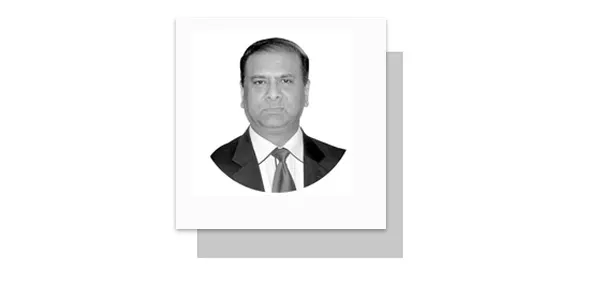Muhammad Nadeem Bhatti
PAKISTAN and India are two rival neighboring countries. Both states got independence in August 1947 and, since then, have fought four major wars, and one was this close to breaking a nuclear war against each other. Strong political influence and extremism on both sides have never let people like each other. This is the reason why India-Pakistan cricket or hockey matches are considered to be high-voltage. Similarly, the crossfire from both borders takes the lives of several innocent civilians every year. And the only thing that can stop it is the friendly relations between the nation, which is one of the biggest challenges for UNO and superpower countries like the US, Russia, and China.
However, if politicians want peace, they can convince their people to stop hatred and hateful comments about each other. But, as they say, politics is a dirty game, and it will be a challenge for them to end this rivalry and promote bilateral relations that can take the nations toward peace and prosperity. This way, Pakistan and India can save millions of $ that they spend on their defense budget every month.
Recently, Pakistan’s Foreign Minister (Bilawal Bhutto Zardari) visited India. He is the first and youngest high-level Pakistani official to have visited India in almost 12 years. Despite several thorny issues, the minister’s decision to visit India to participate in the Shanghai Cooperation Organization (SCO) meeting could be seen as a positive development. At the same time, it was a missed opportunity to improve ties between the two sides. Bhutto was cautious about his trip’s implications, as his political rival Imran Khan’s party had already accused him of compromising on the “Kashmir cause.” But his statement was, “My decision to attend this meeting illustrates Pakistan’s strong commitment to the charter of SCO,” he said on Twitter prior to his departure to Goa.
The Pakistani foreign minister also said the international community should “continue to urge Afghan authorities to adopt universally accepted principles of political inclusivity, and respecting the rights of all Afghans, including girls’ right to education.” All in all, Bilawal Bhutto’s visit to India was a great effort to melt the ice, decrease tension between both countries and begin with bilateral trade to ease the citizens of both sides. But it was highly disappointing how he was received in India, and a number of directed extremists in India did not appreciate him visiting the rival nation, which is not a symbol of good hospitality of a democratic country. But if people, establishments, and politicians want the country to grow, they must appreciate the efforts of our young foreign minister and promote two-way trade between both states.
The journey of Bilawal Bhutto Zardari goes way back to the 1960s, when Zulfiqar Ali Bhutto, his maternal grandfather, led the PPP’s foundation. Mr. Bhutto was the man who gave Pakistanis the real concept of democracy. He got famous in the mid-60s and was finally able to make a party in 1967 that swept the election in 1977. However, after a couple of months, he was given a death sentence in a murder case in 1979, and the military took over and ruled for a whole decade. One of his sons was found dead in a hotel room in France, and the other one was shot dead by Sindh police in Sindh in the early 90s. However, several years later, after the death of Mr. Bhutto, his daughter (Mohtarma Benazir Bhutto) gained fame and became the first female Prime Minster of Pakistan as well the entire Islamic world. In 2007, she was killed by a gunshot and bombing in Rawalpindi after she finished her speech and sat in her car. Her assassination caused immediate panic in the entire country; people everywhere condemned and moaned over her death.
In the 2008 elections, her then Husband (Asif Ali Zardari) took over the party and became the president of the country. Fortunately, his tenure was one that got completed without any army intervention, fake cases, and scandals. Soon after that, the party gave the country Mr. Bilawal Bhutto, who was not used to the Pakistani culture and accent but tried really hard to adapt to it. Mr. Asif Zardari has trained his son to serve the country, no matter what. He advised him to work hard, stay faithful, not abuse power, and carry out the prime objective of the Pakistan People’s Party in the best way possible, which was to provide people with food, clothes, and house.
Currently, he is the chairman of PPP, and the Foreign Minister of our country, representing us on all international forums. Also, the invitation to the Pakistan foreign minister to attend the SCO meeting was sent in January, days after Pakistan’s Prime Minister (Mian Mohammad Shahbaz Sharif) offered to hold bilateral talks between India and Pakistan.
In my opinion, the initiative of young foreign Ministers should be appraised on all platforms. If Pakistan and India shake hands to boost their business and bilateral trade, no power on earth can compete against the nations. Both states have land that is best for farming in Asia. In the same way, the states are rich in natural reserves and are gifted with all four seasons. In addition, the population is almost one-fourth of the entire world, and the Armed forces are ranked in the top ten.
This means poverty can be eliminated if people from both sides put efforts towards improving the relationships and promoting trade and exports. Also, the defense budget can be utilized in the health, infrastructure, and education sector, which can put both nations on the path of success, happiness, and prosperity. Our politicians should focus on eliminating poverty, unemployment, and un education rather than spending hundreds of thousands of rupees on their foreign tours and renovating government residences. And only then can our nation grow and can compete with the world at a full pace.
—The Writer is a Senior Social and Political Analyst can be found at [email protected]










